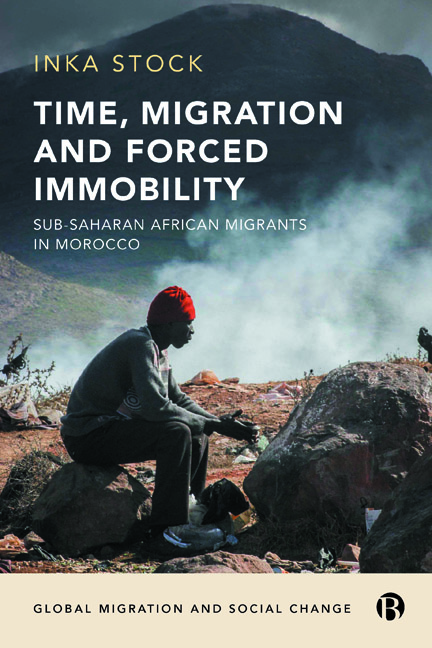Book contents
- Frontmatter
- Global Migration And Social Change
- Contents
- List of Figures and Tables
- Acknowledgements
- Series Preface
- 1 Introduction
- 2 EU Externalization Policies and their Impact on Migrants in Morocco
- 3 Travelling Adventures: Migration as an Existential Quest
- 4 Arriving in Morocco: Becoming Trapped in a Context of Uncertainty
- 5 Facing Time and the Absurd
- 6 Migrant Communities in Morocco
- 7 Waiting in Desperate Hope
- 8 Conclusion
- Bibliography
- Index
8 - Conclusion
Published online by Cambridge University Press: 30 April 2022
- Frontmatter
- Global Migration And Social Change
- Contents
- List of Figures and Tables
- Acknowledgements
- Series Preface
- 1 Introduction
- 2 EU Externalization Policies and their Impact on Migrants in Morocco
- 3 Travelling Adventures: Migration as an Existential Quest
- 4 Arriving in Morocco: Becoming Trapped in a Context of Uncertainty
- 5 Facing Time and the Absurd
- 6 Migrant Communities in Morocco
- 7 Waiting in Desperate Hope
- 8 Conclusion
- Bibliography
- Index
Summary
Introduction
The main aim of this book has been to document and describe the life of a group of migrants who had been stuck in Morocco for many years in order to shed light on what forced immobility has actually done to them as persons. In particular, the book has attempted to uncover how migrants’ lives in Morocco have affected their sense of self and their prospects for the future.
The description of migrants’ personal experiences has been framed against academic and policy discourses which are centred on notions of transit migration. As I argued in the introduction, transit migration is based on a variety of concepts which have been criticized frequently for their dichotomist usage in general migration theory and policy making. The most notorious among them are certainly mobility versus immobility (Schapendonk 2011), illegal versus legal (Willen 2007, Alpes 2011), forced versus voluntary migration (Malkki 1995b, Turton 2003a, Bakewell 2008b) but also place versus time (Harvey 1989, Cwerner 2001).
In transit discourse, mobility has preference over immobility and illegal over legal forms of migration. As a consequence, transit migrants are imagined as ‘mobile’ and on the move rather than as ‘stuck’. This is reflected in the concentration of state efforts to strengthen border enforcement in ‘transit countries’ in order to contain migrants’ predicted movement further north. It is further reflected in recent immigration policies which grant migrants only temporary residency permits and restricted access to economic, social and political rights in the country. As indicated in Chapter 3, this stems from a rather reductionist view of ‘the migrant’ as a rational, economic animal, who migrates primarily to maximize his or her profit and economic possibilities by moving toward the economically more developed European mainland. The overwhelming concern with mobility at the expense of immobility is also evident in the little interest states devote to the development of coherent asylum and settlement policies for migrants in so-called transit countries. Thus, illegality of migrants is actually reinforced and created by the state itself when legal options to migrate or settle become close to non-existent.
- Type
- Chapter
- Information
- Time, Migration and Forced ImmobilitySub-Saharan African Migrants in Morocco, pp. 153 - 168Publisher: Bristol University PressPrint publication year: 2019

